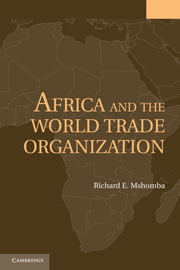Book contents
- Frontmatter
- Contents
- List of Tables and Figures
- Acknowledgments
- List of Abbreviations
- Map of Africa
- 1 INTRODUCTION
- 2 DISPUTE SETTLEMENT UNDERSTANDING
- 3 TRADE-RELATED ASPECTS OF INTELLECTUAL PROPERTY RIGHTS
- 4 AGRICULTURE IN THE DOHA ROUND
- 5 TRANSPARENCY IN GOVERNMENT PROCUREMENT
- 6 AID FOR TRADE
- 7 CONCLUSION
- Bibliography
- Index
1 - INTRODUCTION
Published online by Cambridge University Press: 27 February 2010
- Frontmatter
- Contents
- List of Tables and Figures
- Acknowledgments
- List of Abbreviations
- Map of Africa
- 1 INTRODUCTION
- 2 DISPUTE SETTLEMENT UNDERSTANDING
- 3 TRADE-RELATED ASPECTS OF INTELLECTUAL PROPERTY RIGHTS
- 4 AGRICULTURE IN THE DOHA ROUND
- 5 TRANSPARENCY IN GOVERNMENT PROCUREMENT
- 6 AID FOR TRADE
- 7 CONCLUSION
- Bibliography
- Index
Summary
the objective of this study is to examine the world Trade Organization (WTO) – its enforcement mechanism; its broadened mandate, illustrated by the Agreement on Trade-Related Aspects of Intellectual Property Rights (TRIPS); agriculture in the Doha Round of the WTO; the WTO's pursuit of additional agreements; and its endeavor to streamline assistance to developing countries through an “Aid for Trade” scheme – all in the context of Africa.
Before the WTO was established in 1995, few people knew there was an international organization that set trade rules. However, the WTO was preceded by and is a product of the General Agreement on Tariffs and Trade (GATT), in operation since 1948. The WTO has gained exposure and notoriety primarily from demonstrations against it at the WTO Ministerial meetings. These demonstrations are usually well orchestrated and manage to draw much media attention, often eclipsing the agenda items of the Ministerial meetings. Many trade economists who are usually quite comfortable with their theories have been put on the defensive as a result of the growing negative publicity that the WTO and globalization have received. Among them is the renowned Jagdish Bhagwati, who has published a book solely defending globalization (Bhagwati, 2004).
However, criticism of the WTO is not necessarily a campaign against trade and globalization. The criticism is often targeted at the expanding mandate of the WTO, in terms of enforcement, its broadening coverage, and the glaring asymmetry (in terms of the capacity to negotiate) between developing and developed countries.
- Type
- Chapter
- Information
- Africa and the World Trade Organization , pp. 1 - 24Publisher: Cambridge University PressPrint publication year: 2009



